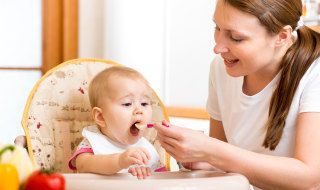
Mothers should be alerted to the risks of sharing spoons with toddlers, dental teams have been warned.
The British Association of Dental Therapists (BADT) are warning that children’s oral health messages must begin at home, after a study looked at the potential transmission of oral bacteria from mother to child and acknowledged that many common oral diseases could be prevented with simple health behaviours.
‘There have been many studies about the transmission of cavity-causing bacteria from mother to baby,’ Fiona Sandom, president of the BADT, said.
‘The primary culprit is Streptococcus mutans, that can pass from person to person through the transfer of saliva so sharing utensils, blowing on food, and even kissing toddlers on the mouth all pose a risk.
‘As dental professionals, we should be educating parents about the risks to primary dentition that is especially vulnerable during the period of eruption.
‘But tooth decay is caused by many other factors and, as well as highlighting the dangers of transmitting infectious saliva, we also need to discuss good oral hygiene (for mother and child), a no-sugar diet and the importance of avoiding bad feeding practices, such as letting a baby constantly suck on the spout of a beaker full of juice, milk or other sugary drinks.
‘Baby teeth are particularly vulnerable to decay and it is never too early to talk about prevention and good oral health practices.’
Passing bacteria from mother to child
The study showed that 11% of mothers believed oral bacteria couldn’t be passed from mother to child.
Child health clinics in Finland used a questionnaire to ask mothers the issues of oral health knowledge and behaviours and found the most common bacterial transmission from mother to child’s mouth was kissing children on the lips (38%), followed by sharing a spoon when feeding children (14%).
‘Children’s dental health education must begin with mothers-to-be,’ Fiona added.
‘By highlighting the possibility that their own dental health can be compromised during pregnancy due to hormone changes, it encourages effective and regular cleaning habits that will help prevent tooth decay and caries and, therefore, reduce the risk of any negative transmission to their offspring.
‘As dental therapists, we need to share with parents the key preventive oral health measures that will help to eradicate children’s tooth decay.’


